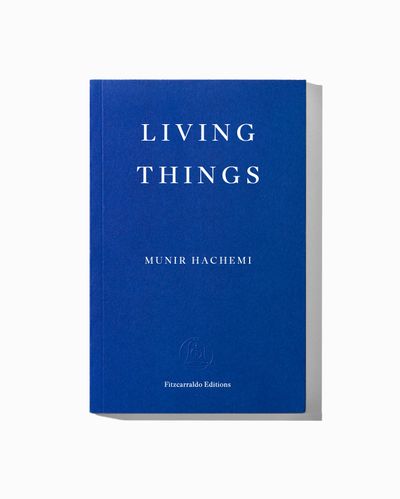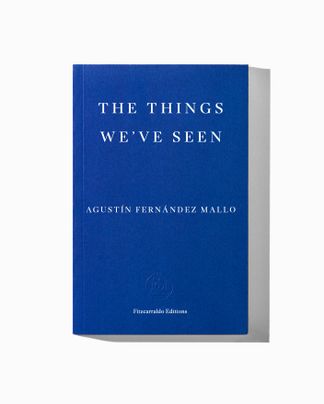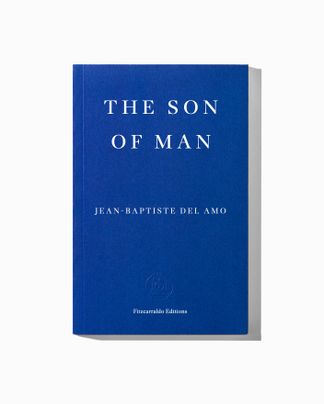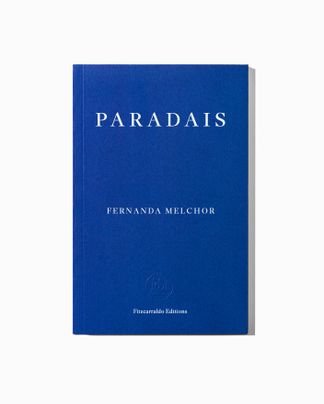Living Things follows four recent graduates – Munir, G, Ernesto and Álex – who travel from Madrid to the south of France to work the grape harvest. Except things don’t go as planned: they end up working on an industrial chicken farm and living on a campsite, where a general sense of menace takes hold. What follows is a compelling and incisive examination of precarious employment, capitalism, immigration and the mass production of living things, all interwoven with the protagonist’s thoughts on literature and the nature of storytelling. A genre-bending and dystopian eco-thriller, Living Things is a punk-like blend of Roberto Bolaño’s The Savage Detectives and Samanta Schweblin’s Fever Dream, heralding an exciting new voice in international fiction.

Living Things
Translated by Julia Sanches
French paperback with flaps, 120 pages
Published 20 June 2024
Living Things
Translated by Julia Sanches
I. ARTIFICIAL RESPIRATION
‘We can’t change reality, but we can change the subject.’
— James Joyce, as cited by Ricardo Piglia
The day I met my friend G, he told me that as a kid he devised a theory about short stories that stayed with him all his life. It shouldn’t come as a surprise that the purpose of stories is to classify, to impose order and hierarchy on the real world. But reality is a wilderness – a jungle or desert – a place that cannot be mapped. Every time something wild disrupted his life, my friend G would tell a story, any story, it didn’t matter what, anything would do. His parents would be screaming at each other at home, and he’d start talking about how the girl he liked had tripped in class, or how the baker had short-changed him, or whatever. He kept up this habit, or tic, as he got older – or maybe the truth is that he never lost it – and went on perfecting his theory. ‘Listen, the cut-off point between the way we cast light on the world and the world itself is the exact moment when that light is lost: death. Every civilization has built its identity – its cosmology or Weltanschauung – around this point. I can’t think of a single work of fiction where someone dies without saying or at least trying to say last words, words that are then subjected to interpretative violence, as if they were a summary or sublimation of everything that person had thought, felt and believed throughout the course of their life.’ I agreed with him because he was right, or at least I thought he was, and also because I always agreed with him. As the years passed, G took this argument to the extreme and said something that could have gone on to become his last words. Roughly, that ‘stories were born the moment our ancestors experienced great terror, the moment before one of them died, or when their camp was under siege, or when they lost a loved one’. That probably wasn’t what he said word for word; his exact phrasing no doubt did a better job of enshrining his thanatotic theory about short fiction. For him stories were intimately connected to death, and one could not be grasped without the other. With time, this theory impacted his relationship with the world, and he began to see proof that he was right all around him. Of course, the same applies to all theories, but among G’s various talents is an ability to drum up the most ingenious proofs, examples that linger in the minds of his listeners. I clearly remember him referring more than once to the scene in Pulp Fiction where Samuel L. Jackson has a gun pointed at him and starts talking about an epiphany he had, something his interlocutor finds incomprehensible and yet in that moment makes perfect sense to that character (and to the viewer). Stories as a way of momentarily forgetting death, stepping into death, or simply looking the other way as life carries on.
G would say that the story I’m about to tell is less a story than it is a prayer to ward off the horror that has been whispering to me for years. Maybe he’s right. But I’m going to tell my story – or our story – anyway, and even more rightfully, by hewing to the truth. So don’t expect to find any embellishments here beyond the ones imposed by language – which I realize are more than a few. A pessimist would insist that language inflicts so many nuances and misunderstandings – which, by the way, are not the collateral damage of language but the conditions of its existence – that the difference between the most straightforward writers and the most prolix, between the most sincere and the ones who take great pains to cut rubies out of lies, that this difference, I say – or rather, a pessimist would say – accounts for less than three or four per cent of all textual embellishment. I’m inclined to take a more positive approach, one less faithful or perhaps more straightforward, and start counting the flourishes at the point where language allows us to speak for ourselves: what you might call embellishment degree zero.
There are dozens of authors who have engaged in a cheap literary tradition that seems to take a variety of forms, all of them extremely poor. I’m talking about found manuscripts, false testimonies and mises en abyme. More than a few writers have dabbled in these sorts of gimmicks, convinced they were inventing literature anew when all they were doing was proving how little they cared about it. Paradoxically, I – who do not consider myself a writer (not any more) – will be the first to declare that the emperor has no clothes, the first to take the floor with the courage needed to flout the frills and artifice, the first to tell the story as it unfolded and nothing more. Time will banish the rest of them to the depths of history. For now, my act of revenge will be to withhold their names.
Before I begin my story, I should give a couple of examples of the kind of literature I want to avoid. In the pages after this preface, you may come across a sentence like ‘everything is covered in blood’. If that happens, don’t try to tease out any hidden meaning. I’m not saying that horror coats everything like a fine, invisible film; nor does the image signify sexual desire or the urge to kill. All you should understand is that everything is covered in blood. The snow, the gravel, the houses, the lamp posts. Everything. And not fresh blood either, but dry blood – extremely dry. Another example: if I describe a scene where a person is wearing a baseball cap, don’t try to tease out a metaphor. There is no metaphor. Just picture someone in a baseball cap. Whatever hermeneutic violence you unleash on this image should be no greater than the violence you unleash on the real world. In other words, this text is only a book inasmuch as everything is a book. That’s it. There is no intent, just storytelling. Embellishment degree zero. If you do your best to read it this way, then I should be able to tell you my story – the real story, what actually happened.
(…)
‘Living Things turns out to be both highbrow and hair-raising (and exceptionally well translated by Julia Sanches). In only 120 pages it succeeds in several separate ways: as an eco-thriller exposing the horrors of industrialized meat production and agrochemicals; as a treatise on rendering truth in fiction; and, not least, as a “lads on tour” caper.’
— Miranda France, Times Literary Supplement
‘[An] impetuous, upstart spirit infuses this short and spunky tale about young, would-be literary men who hit the road in search of adventure but find bleakness and exploitation…. Hachemi’s is the sort of writing that compulsively interrogates itself as writing, in which literary theorizing runs alongside the storytelling…. Hachemi’s documentary-style accounts of low-paid factory labor compellingly take us where most fiction writers would rather not go.’
— Rob Doyle, New York Times
‘Living Things dips blithely in and out of genres and packs more ideas in its lean frame than seems possible. It’s a novel posing as a journal posing as a meditation on the function of the journal that playfully interrogates form and content in art, what it means to write, and what it means to care or not care about anything, or about everything. Munir Hachemi is a magician, and his marvellous book, deftly translated by Julia Sanches, defies adequate description.’
— James Greer, author of Bad Eminence
‘Startling, compulsive, and vibrant; Living Things reads like an ignition. The most honest thing I’ve read in a long time about being young and alive in a beautiful, horrible world.’
— Dizz Tate, author of Brutes
‘A sinister, suspenseful novel, Living Things exposes how the biotech industry will take the foundations of life and mutilate them into things untrustworthy as triffids. Hachemi wrangles form itself, making a sci-fi of what is ultimately extremely quotidian and true: Frankenstein creatures created as fodder to feed an increasingly undernourished world, and the refracted suffering that upholds such a system, in which living things – worker, plant and animal – are made consumable parts in helix. Hachemi deftly lays bare the cannibalistic bent at the heart of global capitalism.’
— Abi Andrews, author of The Word for Woman is Wilderness
‘Heady, diaristic and compulsively readable in Julia Sanches’s perfect translation, four reckless and stubborn college students get themselves caught in the hell of factory farming in Southern France. To say that Living Things is a superb eco-thriller is both true and yet falls short of just how magnificently unclassifiable Hachemi’s novel is.’
— Jacob Rogers, The Center for Fiction
‘Hachemi [blends] the comic and horrific into a kind of literary grotesque that viscerally renders the realities for both the humans and animals caught up within industrial systems of exploitation: the suck of the narrator’s Zoo York trainers as they sink into a floor deep with chicken shit, while he desperately tries to harden himself to his role grabbing panicked chickens, is but one example of Hachemi’s ability to find the exact detail that can bring a scene to life.’
— Peter Adkins, Review31
‘[A] short, horrific, astonishing novel … by turns cool and frantic, dissociated and visceral, and all the more unsettling for it. Animal cruelty becomes mundane, sandwiched between minutely rendered … and genuinely funny accounts of negotiations over where to sleep, what to eat, the everyday stuff of life…. Living Things, superbly translated by Julia Sanches, won an English PEN Translates Award in 2023, and Hachemi was named one of the best young Spanish novelists by Granta in 2021. In this, his first novel, it is apparent why.’
— Sadie Graham, Toronto.com
‘Living Things is a short novel that changes its skin – and almost its genre – in each of its seven parts … A work of autofiction that not only defines the self against lived and narrated experience, but also functions as an indictment of social, political, economic and health systems … [T]he fact that this all happened to the author affects us not only as readers, but as human beings.’
— Carlos Zanón, El País
‘From the outset, the first person narration is interwoven with a multitude of meta-literary and philosophical reflections that eventually form a rich second skin, a subterranean engine through which the real story, beyond the descriptions of escapades and setbacks, begins to be understood. A magnificent debut.’
— Eugenio Fuentes, La Nueva España
‘Hachemi counterbalances the uneasy atmosphere with a constant, subtle underlying humour that feels like a burst of fresh air. Absurdity and latent danger, stirred up in a French heatwave by the naïve insouciance of a group of increasingly tense youths, create an absorbing, somewhat Kafkaesque mood … [Hachemi] weaves a delicately disturbing tale that contains all the rage and disappointment of facing a reality where only helplessness is possible.’
— Gabi Martínez, La Vanguardia
‘An endless array of sounds and ideas reverberate through these pages, at times apocalyptic and at other times deceptively naïve.’
— Qué Leer
‘Blending together allusions to Hemingway, Borges, Bolaño, Houellebecq and even Lenin, with reflections on Google, the true nature of the livestock industry, the ins and outs of temp work agencies, ecological stability, the free market and the paradoxes of diary-keeping, Munir Hachemi superimposes layers of reality with quasi-apocalyptic detours that reveal the menace underlying seemingly banal situations.’
— María Teresa Lezcano, Diario Sur
Munir Hachemi’s career as a writer began with them selling their stories in the form of fanzines in the bars of the Lavapiés neighbourhood of Madrid. They are the author of Living Things (2018) and The Mulai (2023), and are also a translator from Chinese and English. In 2021, they appeared on Granta’s Best of Young Spanish-Language Novelists list.
Julia Sanches is a literary translator working from Portuguese, Spanish and Catalan. Recent translations include Boulder by Eva Baltasar, shortlisted for the International Booker Prize 2023, and Undiscovered by Gabriela Wiener, longlisted for the same prize in 2024. Born in Brazil, she currently resides in the United States.




